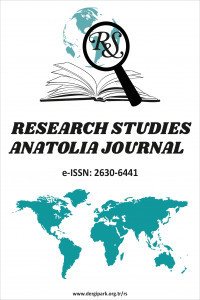BARIŞA YÖNELİK PSİKOLOJİK YAKLAŞIMLAR; MODERN PSİKOLOJİDE BARIŞ
Barış, disiplinler arası bir çalışma konusudur. Barış; uluslararası ilişkiler, siyaset bilimi, psikoloji, sosyoloji ve eğitim bilimleri gibi alanlarda ağırlıklı olarak çalışılmaktadır. Bu denli geniş bir çalışma alanı olan barış konusunun psikolojik temellerinin ve barışa yönelik psikolojik kuramların ortaya konulması gerekmektedir. Mevcut çalışmanın amacı, barış psikolojisinin tarihsel gelişimini ve barışa yönelik psikolojik yaklaşımları ortaya koymaktır. Bu çalışma, literatür taramasına dayalı olarak yürütülen bir derleme çalışmasıdır. Çalışma sonucunda barış psikolojisi kapsamında ortaya konulan kuramlar ele alınmış ve tarihsel gelişim içinde bu kuramların literatürdeki yerleri ortaya konulmuştur. Çalışmanın, en çok ihtiyaç duyulan zamanda Türkiye’de barış ve barış psikolojisi ile ilgili farkındalığın artırılmasına katkı sağlayacağı beklenmektedir.
Anahtar Kelimeler:
Barış, Barış Psikolojisi, Barış Kuramları
Psychological Approaches to Peace; Peace in Modern Psychology
Peace is an interdisciplinary subject matter. Peace is mostly studied and addressed in the fields such as international relations, political sciences, psychology, sociology and educational sciences. It is essential to present psychological foundations of peace besides psychological theories of peace since peace occupies such a broad field. The aim of the current study is to introduce the historical development and psychological approaches to peace. Review approach was adopted in this study as it is based on literature review. In the end of the study, the researcher addressed psychological approaches to peace and the places of these approaches in the literature in the course of history. The current study is thought to redound to the literature in the way that it will raise awareness about peace and peace psychology.
Keywords:
Peace, Peace Psychology, Peace Theories,
___
- Christie, D. J., Tint, B. S., Wagner, R. V. and Winter, D. D. (2008). Peace psychology for a peaceful world. American Psychologist, 63(6), 540-552.
- Galtung, J. (1967). Theories of peace, a synthetic approach to peace thinking. Oslo: International Peace Research Institute.
- Graf, W., Kramer, G. and Nicolescou, A. (2006). Conflict transformation through dialogue: From Lederach’s rediscovery of the Freire method to Galtung’s “Transcend” approach. Journal Für Entwicklungspolitik, 22(3), 55-83.
- Özkeçeci-Taner, B. (2002). The myth of democratic peace: theoretical and empirical shortcomings of the “Democratic Peace Theory”. Alternatives, Turkish Journal of International Relations, 1(3), 40-48.
- Pettigrew, T. F. (1998). Intergroup contact theory. Annual Review of Psychology, 49, 65-85.
- Spillmann, K. R. and Kollars, N. D. (2010). Herbert Kelman’s contribution to the methodology of practical conflict resolution. Peace and Conflict, 16, 349-360.
- Vezzali, L. and Stathi, S. (2017). The present and the future of the contact hypothesis, and the need for integrating research fields. In A. E. R. Bos (Ed.), Intergroup contact theory (pp. 1-7). London: Routledge Taylor and Francis.
- Vinayak, S. and Sharma, A. (2016). Peace psychology in today’s era. Santosh University Journal of Health Sciences, 2(1), 33-38.
- Weber, A. (2006). Feminist Peace and Conflict Theory. Routledge Encylopaedia on Peace and Conflict Theory.
- Yayın Aralığı: Yılda 4 Sayı
- Başlangıç: 2018
- Yayıncı: Arif YILDIZ
Sayıdaki Diğer Makaleler
KİŞİLİK VE DUYGUSAL ZEKA: Y KUŞAĞIYLA İLGİLİ BİR ARAŞTIRMA
BARIŞA YÖNELİK PSİKOLOJİK YAKLAŞIMLAR; MODERN PSİKOLOJİDE BARIŞ
5302 SAYILI YASANIN YERELLEŞME BAĞLAMINDA DEĞERLENDİRİLMESİ
ULUSAL KIRSAL KALKINMA FONLARININ SÜT ÜRETİCİLERİ ÜZERİNE ETKİSİ: ŞARKİKARAAĞAÇ ÖRNEĞİ
BATI’NIN BİR HEGEMONYA KURMA ARACI OLARAK ORYANTALİST BİLGİ VE SÖYLEM ÜRETİM SÜRECİNİN ANALİZİ
ELEKTRONİK TİCARET VE MOBİL TİCARET ÜZERİNE BİR İNCELEME: META-ANALİZ ÇALIŞMASI
